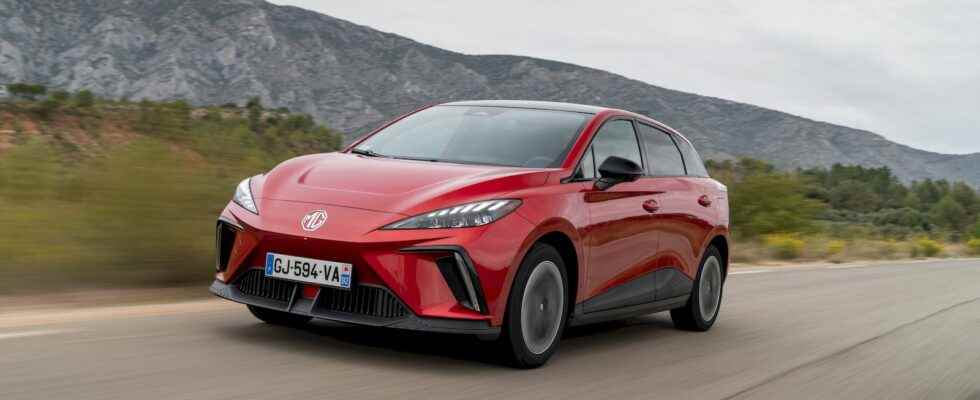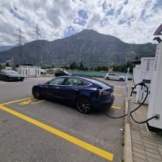An electric car without breaking the bank, that’s the promise of MG’s latest addition: the MG4 with its 64 kWh battery. But is it enough to cross France without incident with its autonomy? This is what we will examine using our reference routes.
If the other vehicles in this series are generally quite expensive, this is not the case with the MG4, which is coming to turn the electric car segment upside down, with unbeatable prices. But today we’re focusing on its ability to carve the road, using our two reference courses.
To ensure that all vehicles are on an equal footing, the rules are as follows: the start will be at 100% battery, the finish at 20% and the vehicle will have to drive at the limit speeds. We will first come back to the characteristics of the MG4 (autonomy, battery, recharging power) before confronting them with the reality on the ground.
You will find below a summary table summarizing for each car concerned the cost of the journeys, the total duration as well as the charging time. What if the MG4 managed to surprise us on long trips?
The characteristics of the MG4 (64 kWh)
MG has achieved a feat that many manufacturers fail to achieve: to offer a car with a WLTP range of 450 kilometers, at a contained price. In effect, the MG4 and its 64 kWh battery are available from 32,990 euros, excluding the ecological bonus, which allows the end customer to drive with them for 26,990 euros.
Battery life, however, is only part of the equation as you probably know, and it’s nothing without plenty of charging power, allowing you to carve the road without worry. On the MG4, it peaks at 135 kW, which allows to go from 10 to 80% in about 35 minutes.
The CCS Combo port that equips the MG4 allows it to charge on all available networks, Tesla Superchargers open to all through Ionity, Fastned and Totalenergies or the newcomer Electra. As usual, A Better Route Planner will be used to plan the routes, with the default consumption reference.
Route planning
In order to simulate what happens in reality, we start trips at 100% battery, considering that you have to pay for this filling at the average price per kWh in France, currently at 0.17 euros. The 64 kWh of the MG4 then represents 11 euros. We will take this cost into account when taking stock of each major journey.
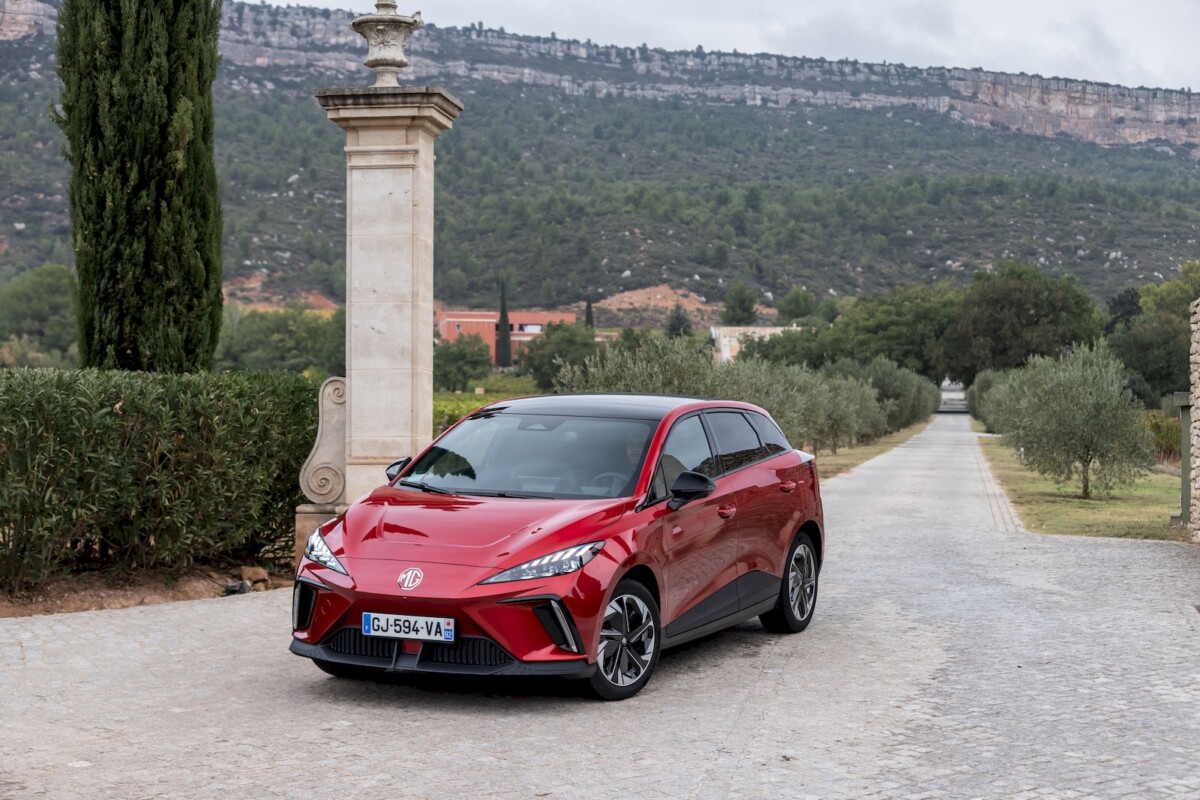
Our two major reference trips remain unchanged, with a 530 kilometer summer route (Orléans – Arcachon) and a 850 kilometer winter route (Caen – Chamonix-Mont-Blanc). For the summer route, the parameters shown in A Better Route Planner are as follows: 25 degrees Celsius outside temperature, no wind, arrival at a charging station with 10% battery remaining and arrival at destination at 20%. For the winter trip, it’s essentially the same, apart from the weather, where we chose a temperature of 0 degrees Celsius.
The balance sheet of the different routes
500 kilometers without incident, taking your time
The MG4 does not manage to make the trip with a single stop between Orléans and Arcachon while respecting the instruction which is to arrive with 20% of battery. Keeping the default settings, A Better Route Planner also recommends three recharges, respectively of 8, 23 and 19 minutes.
Nevertheless, it is possible to extend the first charge so as not to need to stop more than twice if necessary. Whatever, the time spent recharging reaches 49 minutes for this 530 kilometer journey.
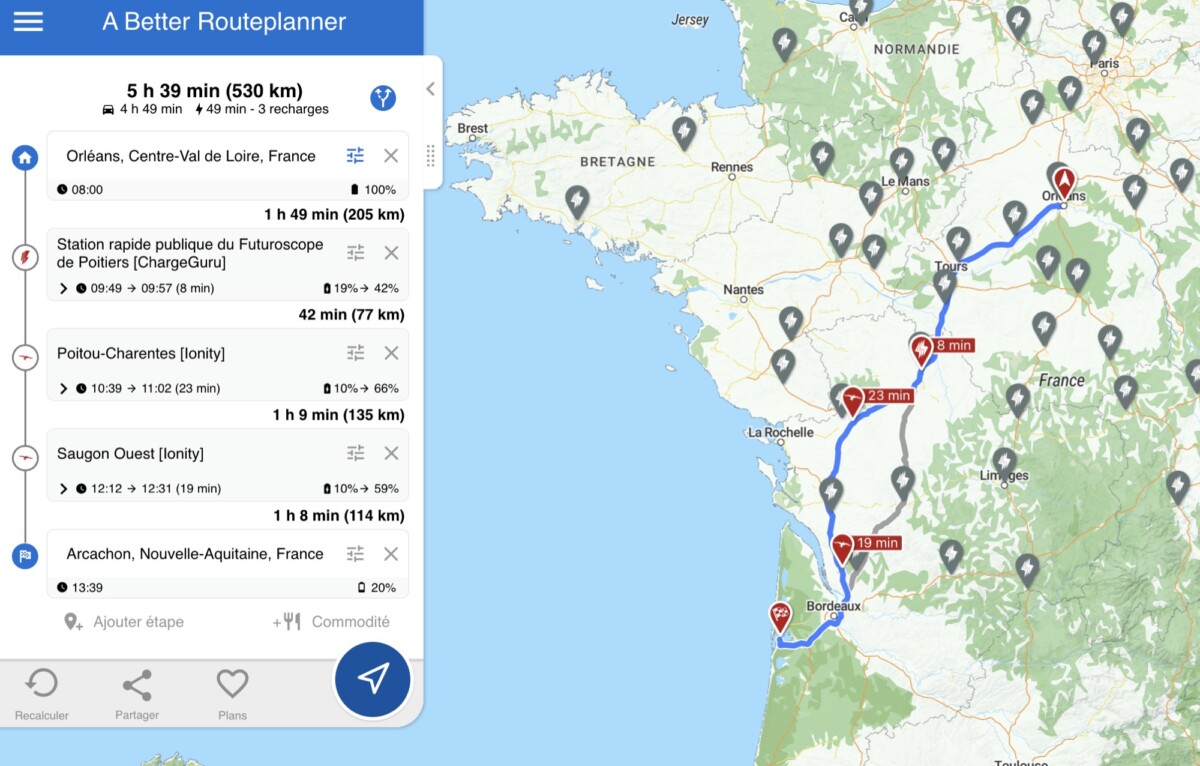
The Ionity network is used, in addition to a public charging station available near Futuroscope, operated by Delta. The cost of charging at the current rate for this trip is around 55 euros (68 kWh at Ionity at €0.69/kWh, and 15 kWh at €0.56/kWh on the ChargeGuru terminal at Futuroscope). You have to add the 11 euros of the home charge to arrive at a total of 66 euros for these 530 kilometers. The expected average consumption is 229 Wh/km, which gives a theoretical range of 280 kilometres.
Crossing France in winter remains easy, although restrictive
If the summer journey is relatively classic for an electric car, you have to take your troubles patiently over the 850 kilometers that separate Normandy from Haute-Savoie. Indeed, the journey below requires a total of five charges, with a maximum distance between charges of 166 kilometers.
In total, over ten hours of travel, almost 25% of the time is spent charging. Three recharges exceed 30 minutes, and two are smaller, respectively 17 and 19 minutes.
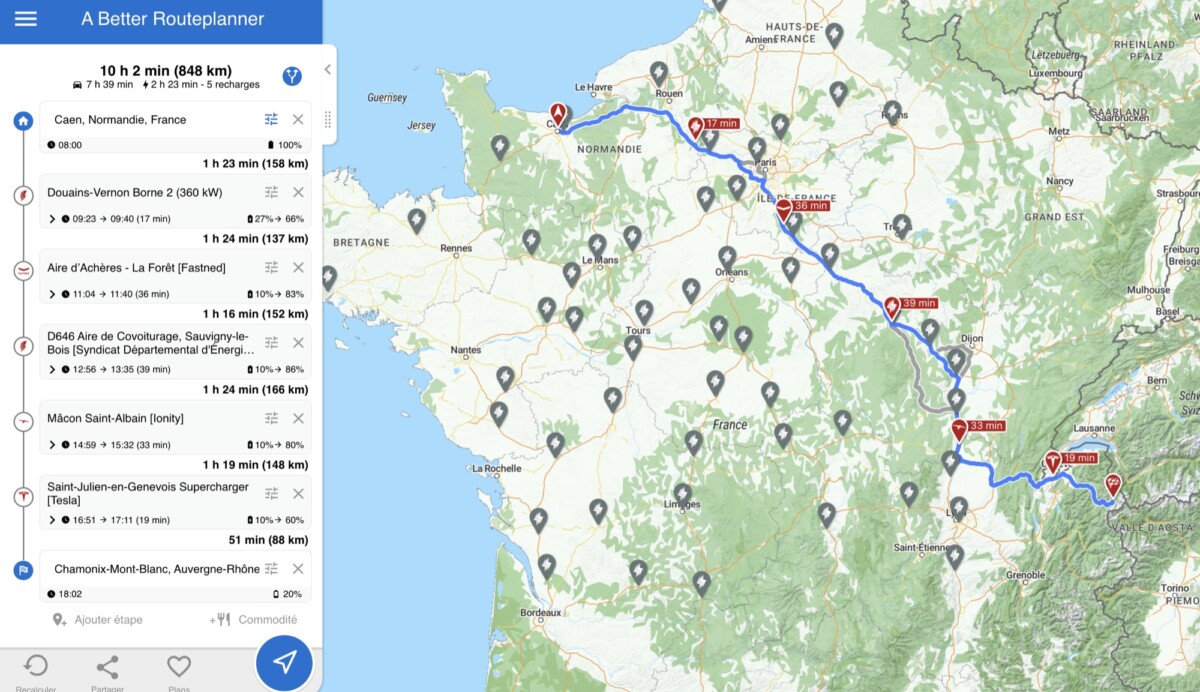
In terms of charging networks used, they could not be more varied, since Fastned, Ionity, Tesla or Kallista Energy are on the route. Good surprise, a free charging station is used halfway (Sauvigny-le-Bois). Other solutions exist not far from there if the latter is not available.
In total, the costs related to fast charging for this trip are estimated at 98 euros (or 130 euros if there is no free charging possible). Adding the home load, this gives a price between 109 and 141 euros all the same. Finally, as far as consumption is concerned, it is estimated at 267 Wh/km, which gives us a theoretical winter autonomy of 240 kilometers on the highway.
Consumption, cost of recharging and autonomy
We summarize the costs and charging times (including 11 euro home charging) in the table below, so you can see at a glance where the MG4 stands compared to other vehicles that have already ready for exercise.
| Vehicle | Summer ride cost | Summer ride charging time | Total summer journey time |
|---|---|---|---|
| Tesla Model 3 Drive | 36 – 49 € | 31 mins | 5 h 09 min |
| Tesla Model 3 Long Autonomy | 31 – 45 € | 13 – 25 mins | 4 hrs 56 mins |
| Kia EV6 58kWh | 52 – 60 € | 38 – 43 mins | 5 hrs 30 mins |
| BMW i4 | 48 – 58 € | 22 – 37 mins | 5 hrs 11 mins |
| Hyundai Ioniq 5 | 72 € | 36 mins | 5 hrs 16 mins |
| Mercedes-Benz EQS | 44 € | 14 mins | 4 hrs 48 mins |
| Tesla Model Y Propulsion | 46 € | 34 mins | 5 hrs 30 mins |
| MG MG4 64 kWh | 66 € | 49 mins | 5h 39min |
| Renault Megane e-tech EV60 | 67 € | 56 mins | 5h 40 mins |
| Kia EV6 77kWh | 56 € | 26 mins | 5 h 07 min |
| Hyundai Kona 64kWh | 61 € | 58 mins | 5 hrs 47 mins |
| Peugeot e-208 | 73 € | 1 hr 13 mins | 6 h 09 min |
| Vehicle | Winter trip cost | Winter ride charging time | Total winter journey time |
|---|---|---|---|
| Tesla Model 3 Drive | 102 € | 1 hr 42 mins | 9:16 a.m. |
| Tesla Model 3 Long Autonomy | 101.3 € | 1 hr 02 mins | 8:27 a.m. |
| Kia EV6 58kWh | 120 € | 1hr 54mins | 9 h 59 min |
| BMW i4 | 147 € | 1 hr 32 mins | 9 h 08 min |
| Hyundai Ioniq 5 | 145 € | 1 hr 29 mins | 9:14 a.m. |
| Mercedes-Benz EQS | 115 € | 50 mins | 8 h 03 min |
| Tesla Model Y Propulsion | 120 € | 1 hr 46 mins | 9 h 42 min |
| MG MG4 | 109 – 141 € | 2 hrs 23 mins | 10 h 02 min |
| Renault Megane e-tech EV60 | 104 – 139 € | 2 hrs 12 mins | 9 h 49 min |
| Kia EV6 77kWh | 143 € | 1 hr 14 mins | 8 hrs 54 mins |
| Hyundai Kona 64kWh | 98 – 132 € | 2 hrs 24 mins | 10 h 01 min |
| Peugeot e-208 | 168 € | 2 hrs 49 mins | 10 h 59 min |
Is the MG4 able to compete with more expensive vehicles?
As you can see above, the MG4 is dead last in both summer and winter, but it’s also (by quite a distance) the cheapest car in the table at the time of this writing. In summer, the cost per 100 kilometers of the trip is about 12.50 euroswhich places it among the most expensive on this type of course.
This is mainly due to its small 64 kWh battery, which will require several quick recharges on the course. This is what today represents the paradox of affordable electric vehicles : their price requires them to have a smaller battery, but they are often less efficient and will require more stops during long journeys. Therefore, to travel long distances, they cost more than some other vehicles.
To end on the summer route, we notice that the gap between the three slowest vehicles is not even ten minutes (Tesla Model Y Propulsion, Kia EV6 58 kWh and MG4), while the price difference is counted in tens of thousands of euros. For those who only do this kind of journey occasionally, an MG4 is quite suitable.
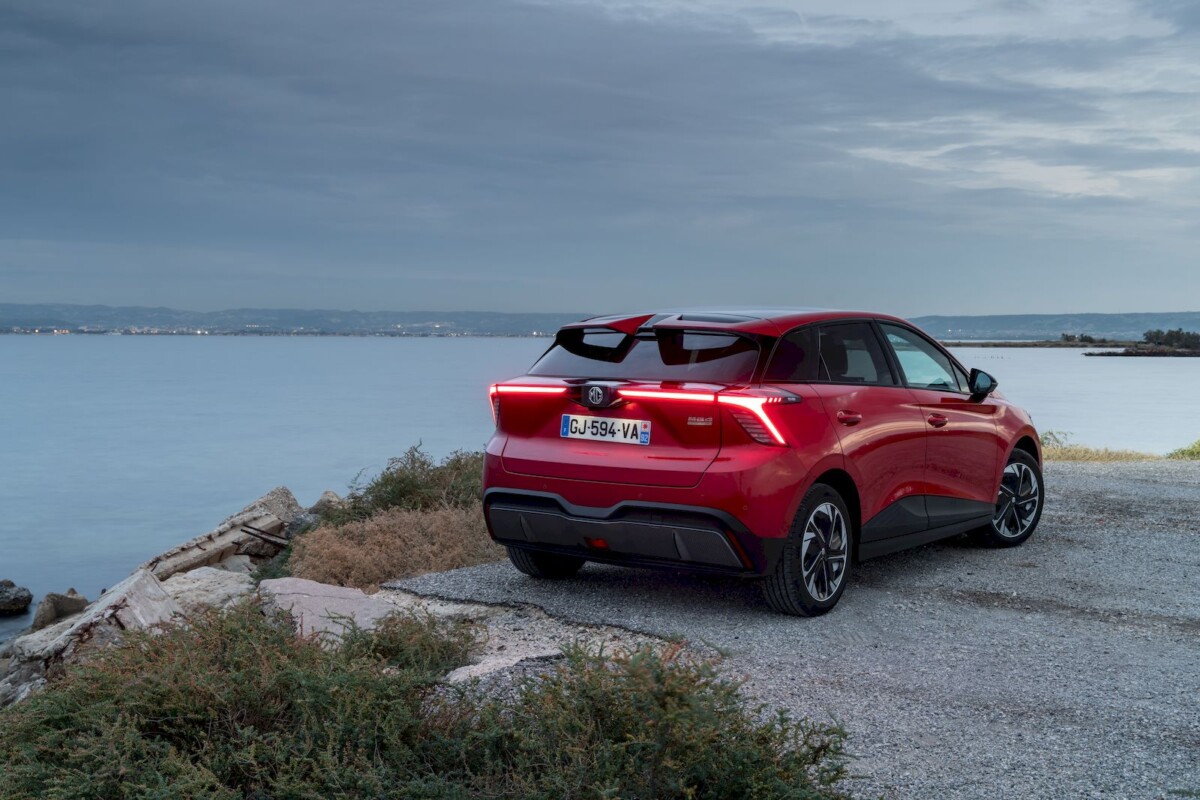
The winter ride shows the limits of the MG4, where 25% of total travel time is spent charging. Three consecutive stops of more than 30 minutes are separated by less than an hour and a half drive each time, which is a constraint to accept. In effect, stopping forty minutes, starting again for an hour and a half and stopping again for more than half an hour is not necessarily ideal.
We thus find at the very end of the ranking the MG4, which takes about 30 minutes more to charge than the Kia EV6 58 kWh, which is the penultimate in the table. The total travel time – including charges – remains acceptable, however, with just over ten hours of travel. In terms of cost per 100 kilometers for the long winter journey, it is still around 16.50 euros.
In conclusion: although the MG4 does not do better than most more expensive electric vehicles, it does not have to be ashamed of its performance on long journeys. Even if it means accepting to lose a few tens of minutes during journeys that exceed 500 kilometres, traveling in an MG4 is quite possible. The increase in the density of fast chargers in France through the various existing networks makes it possible to cross France without fear, almost regardless of the electric vehicle considered.
To follow us, we invite you to download our Android and iOS application. You can read our articles, files, and watch our latest YouTube videos.
